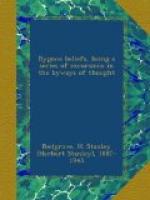[1] JEAN D’ESPAGNET: Hermetic Arcanum, canon 65. (See Collectanea Hermetica, ed. by W. WYNN WESTCOTT, vol. i., 1893, pp. 28 and 29.)
As well as a metallic, the alchemists believed in a physiological, application of the fundamental doctrines of mysticism: their physiology was analogically connected with their metallurgy, the same principles holding good in each case. PARACELSUS, as we have seen, taught that man is a microcosm, a world in miniature; his spirit, the Divine Spark within, is from God; his soul is from the Stars, extracted from the Spirit of the World; and his body is from the earth, extracted from the elements of which all things material are made. This view of man was shared by many other alchemists. The Philosopher’s Stone, therefore (or, rather, a solution of it in alcohol) was also regarded as the Elixir of Life; which, thought the alchemists, would not endow man with physical immortality, as is sometimes supposed, but restore him again to the flower of youth, “regenerating” him physiologically. Failing this, of course, they regarded gold in a potable form as the next most powerful medicine—a belief which probably led to injurious effects in some cases.
Such are the facts from which I think we are justified in concluding, as I have said, “that the alchemists constructed their chemical theories for the main part by means of a priori reasoning, and that the premises from which they started were (i.) the truth of mystical theology, especially the doctrine of the soul’s regeneration, and (ii.) the truth of mystical philosophy, which asserts that the objects of nature are symbols of spiritual verities."[1]
[1] In the following excursion we will wander again in the alchemical bypaths of thought, and certain objections to this view of the origin and nature of alchemy will be dealt with and, I hope, satisfactorily answered.
It seems to follow, ex hypothesi, that every alchemical work ought to permit of two interpretations, one physical, the other transcendental. But I would not venture to assert this, because, as I think, many of the lesser alchemists knew little of the origin of their theories, nor realised their significance. They were concerned merely with these theories in their strictly metallurgical applications, and any transcendental meaning we can extract from their works was not intended by the writers themselves. However, many alchemists, I conceive, especially the better sort, realised more or less clearly the dual nature of their subject, and their books are to some extent intended to permit of a double interpretation, although the emphasis is laid upon the physical and chemical application of mystical doctrine. And there are a few writers who adopted alchemical terminology on the principle that, if the language of theology is competent to describe chemical processes, then, conversely, the language of alchemy must be competent to describe psychological processes: this is certainly and entirely true of JACOB BOEHME, and, to some extent also, I think, of HENRY KHUNRATH (1560-1605) and THOMAS VAUGHAN (1622-1666).




